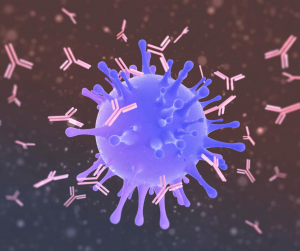Summary of the article Posttranslational modifications induce autoantibodies with risk prediction capability in patients with small cell lung cancer. Lastwika KJ, Kunihiro A, Solan JL, Zhang Y, Taverne LR, Shelley D, Rho JH, Randolph TW, Li CI, Grogan EL, Massion PP, Fitzpatrick AL, MacPherson D, Houghton AM, Lampe PD. Sci Transl Med. 2023 Jan 11;15(678):eadd8469. doi: 10.1126/scitranslmed.add8469. Epub 2023 Jan 11. PMID: 36630482 https://pubmed.ncbi.nlm.nih.gov/36630482/
Antibodies are proteins made by the immune system that “attack” and destroy molecules or cells that are stranger (non-self) to the patient’s body. In autoimmune disorders, the antibodies of the patient mistakenly target the patient’s own cells (self). In these instances, they are called autoantibodies.
Autoantibodies have been observed in some non-autoimmune diseases, for example, a type of lung cancer known as Small Cell Lung Cancer (SCLC). In SCLC, the autoantibodies can attack the patient’s nervous system, developing unique neurological symptoms, also known as paraneoplastic neurological syndromes.
At present, it is unknown what causes the formation of these autoantibodies.
This study focused on the development of a technique that enables the detection of autoantibodies in the plasma of SCLC patients. With this technique, researchers detected several types of autoantibodies that were previously unknown.
Furthermore, this study showed that some proteins found in the external parts of the patient’s cells (called extracellular proteins) are the main target of these autoantibodies, mainly because they have undergone chemical modifications as a result of the cancer.
Researchers want to use their technique to identify these autoantibodies and use it as a clinical tool for early detection and diagnosis of SCLC.
These results are important for patients with SCLC, given that in most cases, when SCLC is diagnosed, the patient has already developed metastasis. In fact, less than 6% of SCLC patients survive beyond 5 years after diagnosis.
Detecting SCLC at an earlier stage may prevent the development of metastatic disease, and thus could significantly improve the patient’s outcome and survival.

